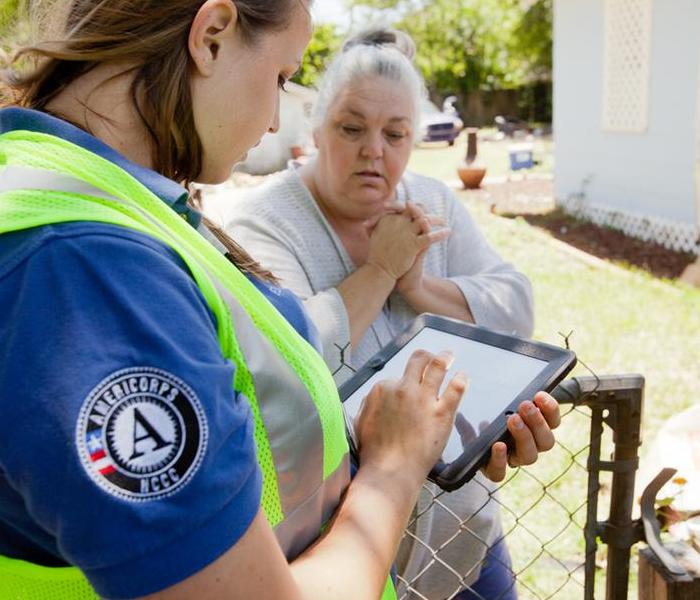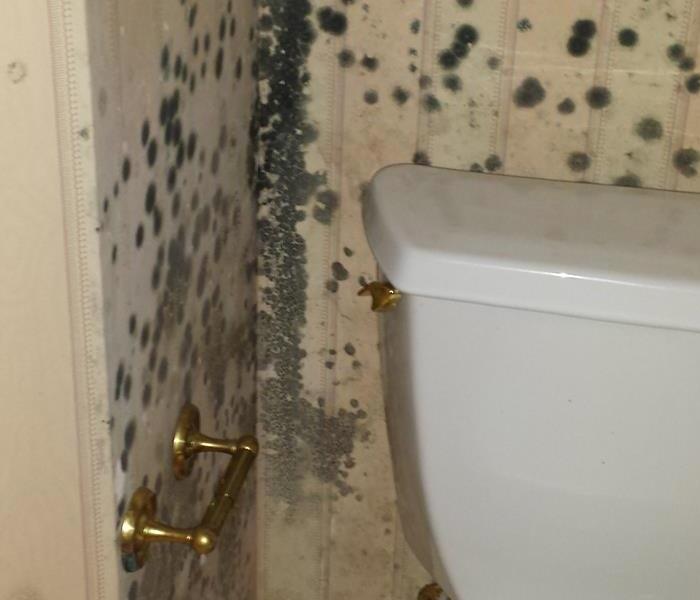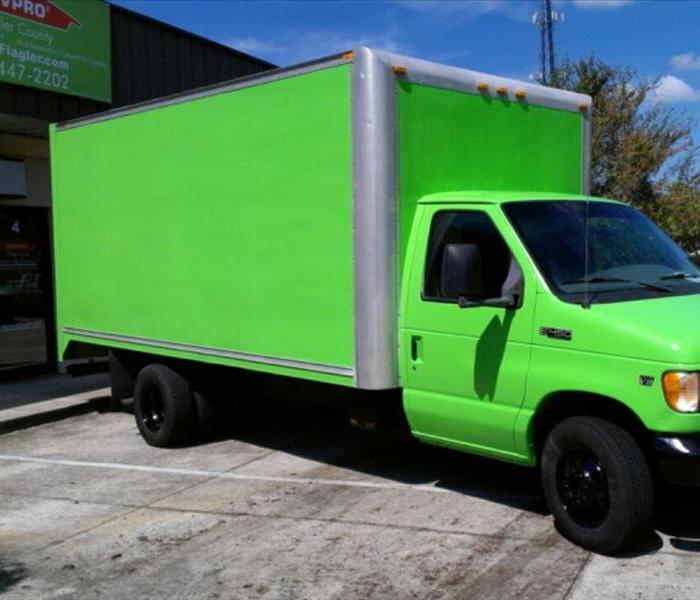Recent General Posts
Pet Preparedness Month: Ensuring Your Furry Friends Stay Safe During Hurricane Season
6/4/2024 (Permalink)
 Don't forget about your furbabies this Hurricane Season!
Don't forget about your furbabies this Hurricane Season!
As we enter the heart of hurricane season, it's crucial to remember that our beloved pets are also vulnerable to the effects of severe weather. Just like any other member of the family, our furry companions need special consideration and preparation to ensure their safety during emergencies. In honor of Pet Preparedness Month, SERVPRO of Flagler County offers some essential tips for caring for your pets during hurricane season.
Create a Pet Emergency Kit: Just as you would assemble an emergency kit for your family, preparing one specifically for your pets is essential. This kit should include:
- Ample supply of food and water for at least three days.
- Medications and medical records are stored in a waterproof container.
- Leashes, harnesses, and carriers to safely transport your pets.
- Comfort items such as blankets, toys, and familiar bedding.
- Recent photos of your pets in case they get lost.
- Contact information for your veterinarian and local animal shelters.
These readily available items can make a significant difference in ensuring your pet's comfort and well-being during a hurricane or evacuation.
Develop an Evacuation Plan: Before a hurricane strikes, it's crucial to have a well-thought-out evacuation plan in place for you and your pets. Identify pet-friendly shelters, hotels, or relatives' homes where you can seek refuge. Make sure to include your pets in evacuation drills and familiarize them with their carriers or travel crates to reduce stress during evacuations.
Ensure Proper Identification: If you're separated during a hurricane, proper identification is key to reuniting you with your furry friend. Ensure your pet wears a collar with an up-to-date ID tag containing your contact information. Additionally, consider microchipping your pet as a permanent form of identification, greatly increasing the chances of being reunited if lost.
Secure Your Home: Before a hurricane lands, take steps to secure your home and minimize potential hazards for your pets. Bring outdoor pets indoors or ensure they have access to a secure shelter. Trim tree branches, secure loose outdoor items, and reinforce fencing to prevent escape or injury. Additionally, consider placing stickers on windows or doors to alert rescue workers to the presence of pets inside your home.
Stay informed about approaching hurricanes and follow evacuation orders issued by local authorities. Keep a weather radio or download a reliable weather app to stay updated on storm developments and evacuation routes. Planning and staying informed will help you make the best decisions for your and your pets' safety during hurricane season.
As responsible pet owners, we must ensure the safety and well-being of our furry companions, especially during times of crisis. Following these tips and taking proper measures can help your pets stay safe and comfortable during hurricane season. Remember, a little preparation can go a long way in protecting your pets and giving you peace of mind when faced with the uncertainties of severe weather.
Pet Preparedness for the Hurricane Season
6/7/2023 (Permalink)
 A dog and cat sitting outside while a storm is brewing behind them.
A dog and cat sitting outside while a storm is brewing behind them.
As pet parents, we understand the importance of keeping our furry friends safe and protected, especially during unexpected emergencies or disasters. Whether it's a natural calamity like a hurricane or a personal crisis such as a medical emergency, being prepared can make all the difference for our beloved pets. That's why dedicating a whole month to pet preparedness is crucial, as it reminds us to take proactive steps to ensure the well-being of our four-legged family members.
Accommodations:
Pet preparedness goes beyond the physical necessities; it also involves planning for temporary accommodations. Research pet-friendly hotels, shelters, or boarding facilities in your area that would welcome your furry friend in case you need to evacuate. Contact these places in advance to understand their policies, requirements, and availability. Additionally, reach out to friends or family members who may be able to offer a safe place for your pet if the need arises. Establishing these connections and options ahead of time can bring you peace of mind during stressful situations.
Emergency Kit:
Preparing an emergency kit for your pet is another vital aspect of pet preparedness. This kit should include at least a week's supply of food and water, medications, a pet first-aid kit, and any necessary medical supplies. Don't forget to pack familiar items like toys, blankets, and comfort objects to help reduce stress during a crisis. It's also wise to have an extra leash, collar, and sturdy carrier or crate readily available. Remember, during an emergency, your pet may need to be transported quickly and safely, so having these items on hand is crucial.
Review and Update:
During Pet Preparedness Month, it's a great time to review and update your pet's emergency plan. Start by ensuring your pet's identification is up to date, including tags with your current contact information and a microchip registration. In case your pet gets lost during a chaotic situation, these measures greatly increase the chances of your pet being identified and returned to you if they are lost. Additionally, gather your pet's essential documents, such as vaccination records, medical history, and proof of ownership, and keep them in a waterproof and easily accessible place.
While we hope to never face an emergency or disaster, being prepared is the best way to safeguard our pets. Pet Preparedness Month serves as a reminder to prioritize their safety and well-being. By taking the time to update identification, create an emergency kit, and plan for temporary accommodations, we can ensure that our furry companions will have the best chance of staying protected and cared for, no matter the circumstances. In the case of an emergency while you are protecting your animals, family, and yourself, let SERVPRO help protect your home. SERVPRO of Flagler County is here to help with your water damage and prevent any further damage from occurring. Call us at 386-447-2202 for 24/7 emergency services and a free estimate.
Does Your Family Have a Disaster Plan?
12/9/2013 (Permalink)
 FL, May 15, 2014 -- Disaster Survivor Assistance Team (DSAT) member Marie Orechoff checks on the FEMA application status of Toni Talley in Pensacola
FL, May 15, 2014 -- Disaster Survivor Assistance Team (DSAT) member Marie Orechoff checks on the FEMA application status of Toni Talley in Pensacola
Disasters can happen quickly and most times without a warning. You never know when basic services, such as gas, electricity, water or telephones will be cut off. Preparing and planning must prepare your family for this. Knowing what to do is your best protection and your responsibility. Here are some ways to help to prepare your family in times of a disaster.
Learn what disasters and emergencies that have the possibility to occur in your area.
Know what to prepare for by calling your local emergency management office or American Red Cross chapter. Learn what disasters can happen rather it’s manmade or natural and found out what are the best ways to prepare for each one. Found out what public warning systems your community has and what they sound like. Learn the disaster plans at your workplace, school, daycare, or other places where your family may spend a lot of time.
Create and Implement a Family Disaster Plan.
Set up a family meeting to discuss what plan needs to be in place and the importance of the plan. Keep the plan simple enough for everybody to understand and follow. This is a team effort and everybody must know what part they play. Explain the dangers of the type of disasters that may occur in your area. Everybody should know what to do in each instance. By discussing everything before disaster strikes, it will allow everyone to be calm and execute the plan.
You then need to make sure you have two meeting places for your family incase everyone is not together. They should be familiar with the locations and know the address. Right outside of your home in case of a sudden emergency or outside of your neighborhood in case you can’t return home or are asked to leave your neighborhood. Separation will play a big factor if the disaster occurs during the times parents are at work and the children are at school. You need to have a plan of getting everybody together.
You should set a primary person outside of the disaster area as your family’s primary contact. Family members should call the contact and tell him or her where they are. Everyone must know the contact’s name, address, and phone number. Found out about shelters in the contact’s area or arrange to stay with that contact if possible. Plan your escape routes and get familiar with them. You should always have alternate escape routes in place.
If you have pets plan on how you will care for them during a disaster. Unless your pet(s) are service animals they are not permitted to be in places where food is served, according to many local health department regulations. Plan where you would take your pets if you had to go to a public shelter where they are not permitted. Make sure you post all important phone numbers and emergency numbers next to all phones in your home.
Practice makes perfect
Once you have your plan implemented it is important you practice it as a family so it will become second hand when the time comes. You may need to modify and change the plan a little over a period of time. Conducting actual drills with your family will help them be better prepared. You should drive all evacuation routes that is designated in your plan. This should be performed at least twice a year. Make sure to keep stored food and water. Also restock after six months to keep goods refreshed. Check your smoke alarms every month and run test on them to insure they are working well. Replace batteries if needed. The National Fire Protection Association and the U.S. Consumer Products Safety Commission has recommended that you change out your fire alarms every ten years. Also make sure to test all fire extinguishers.
SERVPRO of Flagler County - Palm Coast Florida is locally owned and operated and serves Palm Coast, Flagler Beach, Hammock Dunes, Beverly Beach, Bunnell, Marineland, Hammock, Hammock Beach and the surrounding North East Florida communities.
SERVPRO of Flagler – Palm Coast Fl.’s fully certified water removal staff can perform a complete damage assessment to your home of office, and then recommend and follow the industries standards to get your water removal restoration repaired properly available 24 hours a day
Older Posts
What to look for in a restoration company
What is mold ?
What to do when your home floods
What to do when you have a water damage
Hot Water Heater Leak or Failure
Preventing mold growth after a water loss
How deadly is black mold?
mold-all too common after flooding
SERVPRO of Flagler County – Palm Coast Services
Water Damage Fire Damage Disaster, storm and flood damage Mold Damage
What Should I Know When Dealing with my Insurance Company?
12/6/2013 (Permalink)
 Mold Growth from a water damage leak in Flagler Beach FL
Mold Growth from a water damage leak in Flagler Beach FL
When you choose an insurance company, if something happens and you need to file a claim you will be dealing with two primary people from your insurance company, your insurance agent and adjuster.
Insurance Agents are the people who sell policies to people with insurance or “insureds”. Typically, insurance agents do not adjust losses.
Insurance Adjusters “Investigate, interprets policy, pays claim for covered amount based upon negotiated amount or established pricing database (types-staff; independent; local; manager; general adjuster – G.A.; vendor reviewer; public adjuster – P.A.)” (Disaster Academy Manual, p. 14)
There are three common types of Insurance Policies:
1. ACV – Policy which pays a value arrived by calculating the replacement cost and deducting some portion of the value for depreciation.
2. RCV – endorsement to an ACV policy modifying it to pay the full cost of repair, or replacement of items damaged beyond economical repair. (Usually, this is payable only when damaged items are actually replaced).
3. Fire (named peril) – policy which pays only if certain “named” perils are the cause of loss, rather than “all risk” policy which would cover anything not specifically excluded in policy language. (In fire damage restoration there must be a ‘fire’ to be a covered loss – protein ‘fires’ have no combustion) (Disaster Academy Manual, p. 14)
Most Insurance Policies are Broken Down into Four Divisions:
1. Structure
2. Personal Property
- Personal Property is usually a part of Homeowner’s Insurance. However, in certain instances it may not be covered in it. This type of insurance covers the items or contents within a home that aren’t a physical attachment to the structure itself. Soft goods are also covered in this type of insurance. When sorting out personal insurance, the biggest differentiation is the Actual Cash Value of an item versus the Replacement Cost.
Actual Cash Value – is what something actually costs right now in today’s market or the price/value of something based on its usage
Replacement Cost – is the amount of money your insurance company would give you on an item to help replace it. More than likely many items in your home may be outdated, thereby would have depreciated in value. For instance, if you paid $500 for a new TV, a few years ago, now that TV may be worth half as much if that, meaning you would have to make up the difference in cost to replace that particular item.
It is worth noting that Actual Cash Value and Replacement Cost will vary from policy to policy and that you should check with your specific agent.
There are items that aren’t covered under Actual Cash Value or Replacement cost and those are usually antiques, jewelry, or other expensive items that can be found within a household such as art.
3. Additional Living Expense Insurance
- This type of Insurance takes care of all expenses incurred by an “insured” while they cannot live inside of their home.
4. Other Structures (exterior –unattached)
Every Homeowner’s Insurance Policy is different and as a homeowner you should familiarize yourself thoroughly with your policy so you’re already knowledgeable in the event something happens to your home.
SERVPRO of Flagler County - Palm Coast Florida is locally owned and operated and serves Palm Coast, Flagler Beach, Hammock Dunes, Beverly Beach, Bunnell, Marineland, Hammock, Hammock Beach and the surrounding North East Florida communities. Water comes from everywhere and our certified technicians can clean and dry any flood better than its original state. * 24/7 Fire Damage Restoration Service * 24/7 Flood Damage & Water Damage Service * 24/7 Sewage Damage & Sewage Removal Service * 24/7 Mold Remediation *24/7 Bio-hazard Suicide Clean *24/7 Fire Window Roof Board-up
If you would like to schedule service for your home or business, please call today!
Call us at 24/7 at 386 -447-2202
___________________________________________________
Other Interesting Articles
Does Your Family Have a Disaster Plan?
Water damage from damaged plumbing is the primary cause of water-loss insurance claims
NPM 2014 Digital Engagement Toolkit
Carpet Cleaning Flagler - You'll be surprised to learn how much dirt vacuums miss -- and how simple the best cleaning methods really are.
Flagler Duct Cleaning - How Does Commercial and Residential Air Duct Cleaning Differ?
Flagler Mold Damage - What Is Mold?
Fire Damage Flagler - What Is Fire Damage Remediation?
Water Restoration Tips And Guidelines for Flagler County
SERVPRO Flagler is Growing!!
10/13/2013 (Permalink)
 NEW SERVPRO GREEN BOX TRUCK !!
NEW SERVPRO GREEN BOX TRUCK !!
SERVPRO of Flagler County is growing AGAIN!!
Due to continued high demand and growth we have added to our fleet of emergency ready - fire, water and mold vehicles.
Check out the work in progress painting on our newest Box Truck.
This addition provides even more capacity to respond quickly to any residential or commercial Water, Flood, Fire or Mold emergency.
SERVPRO of Flagler County Professionals provide fire and water damage restoration services. We are available 24 hours/7 days a week and are ready to restore damage to your home or commercial structure caused by:
http://www.SERVPROflaglercounty.com





 24/7 Emergency Service
24/7 Emergency Service




